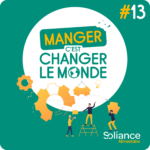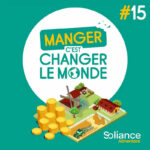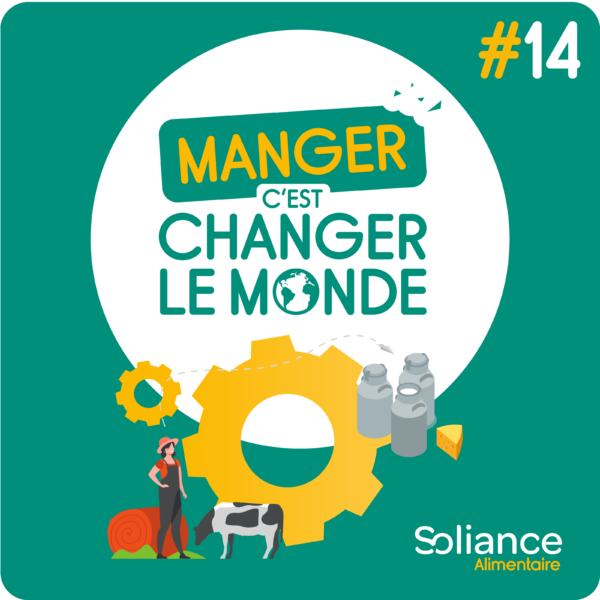Manger, c’est changer le monde, la série de podcasts qui décode les systèmes alimentaires – Épisode 14
Dans l’épisode 13, nous évoquions l’ingénierie de projet comme une méthode de mise en œuvre des projets alimentaires territoriaux (PAT).
Récemment, Agnès Pannier-Runacher, la Ministre déléguée auprès du ministre de l’Agriculture et de la Souveraineté alimentaire, a annoncé dans les colonnes du Télégramme, le lancement d’un projet pilote « Startijin Valait ». Ce dernier vise à réinventer la filière laitière en réduisant de 30 % l’empreinte carbone du lait dans le Finistère. En déplacement à Quimper en avril dernier, Agnès Pannier-Runacher a inauguré ce projet doté d’un budget de 14 millions d’euros.
Arnaud Letailleur, directeur du cabinet Soliance Alimentaire, nous éclaire sur cette initiative institutionnelle, pensée comme un démonstrateur territorial de la transition alimentaire. Le gouvernement, qui a lancé des appels à projet, démontre son ambition pour soutenir des projets collectifs sur ses territoires. Le projet « Startijin Valait », imaginé pour la filière laitière, est un exemple concret de mise en œuvre via l’ingénierie de projet.
Ingénierie de projet : les clés de réussite pour les projets territoriaux
L’ingénierie de projet est une démarche qui consiste à mettre des outils et des ressources au service du développement des projets territoriaux. Pour en savoir plus, nous vous invitons à écouter le podcast n°13 sur l’ingénierie de projet.
La réussite de ces projets territoriaux repose sur 4 éléments clés :
- L’approche territoriale : le projet s’inscrit dans un territoire spécifique qui devient un espace d’expérimentation pilote de la nouvelle initiative.
- L’approche holistique : le projet considère l’ensemble du périmètre de la filière agricole et alimentaire, de l’amont à l’aval.
- Une synergie entre les acteurs : le projet implique une collaboration étroite entre tous les acteurs de la filière, publics et privés. Dans le cadre du projet « Startijin Valait », le ministère de l’Agriculture et de la Souveraineté alimentaire intervient comme financeur. Le projet associe également la chambre d’agriculture, les agriculteurs, les coopératives, etc.
- Un modèle économique à impact : le projet doit être viable économiquement et générer des impacts positifs sur l’environnement, la société et l’économie.
Le projet de la filière laitière dans le Finistère coche donc toutes les cases pour apporter les innovations nécessaires à une transition alimentaire réussie.
Impulser l’innovation dans les projets territoriaux
Les projets territoriaux peuvent être considérés comme des “impulseurs d’innovations” afin de répondre à des défis environnementaux et de compétitivité. Dans le cadre de « « Startijin Valait », les innovations visant à atteindre la neutralité en réduisant les émissions de méthane ou en stockant du carbone, pourraient être de plusieurs ordres, tels que :
- Le développement de l’agroforesterie
- Le développement de prairies permanentes
- La diminution de l’âge moyen de vêlage
- …
À ce jour, nous ne sommes pas en mesure d’affirmer que le projet contiendra ces mesures, car il est actuellement en phase d’étude. Tout reste donc à faire et il convient de mobiliser toutes les ressources nécessaires pour passer de la phase d’étude à la mise en œuvre.
Les projets territoriaux, des projets sur le long terme
À la différence des entreprises qui doivent rapidement dégager une rentabilité, les projets territoriaux s’inscrivent sur le long terme, car ils visent à engager les territoires sur le chemin de la transition. C’est pourquoi, le ministère de l’Agriculture et de la Souveraineté alimentaire ainsi que les acteurs publics doivent soutenir ces initiatives, parce qu’ils “dérisquent” le projet en finançant ses premières étapes.
Pour « Startijin Valait », le financement public s’élève à 14 millions d’euros. Les prochaines étapes nécessiteront de nouveaux investissements auxquels les acteurs privés devront contribuer. La feuille de route opérationnelle s’étend sur 10 ans, bien au-delà des cycles d’investissement habituels des entreprises (3 à 5 ans).
Le rôle de Soliance Alimentaire
“Comme je dis souvent, le conseil qui crée de la valeur, c’est le conseil qui dépasse le papier”, nous indique Arnaud Letailleur.
Chez Soliance Alimentaire, notre approche va au-delà du conseil, car nous sommes des acteurs engagés dans la co-construction des projets.
La co-construction implique une démarche allant de l’étude de faisabilité jusqu’à la réalisation effective du projet. Cela nécessite de travailler sur le montage de l’initiative, d’identifier les partenaires adéquats, et de collaborer avec eux pour concrétiser ces programmes.
Notre objectif est d’accompagner la réalisation de ces initiatives sur le long terme afin de s’assurer que ces derniers soient techniquement, financièrement et économiquement viables.
Notre rôle « opérationnel » pourrait s’accompagner, dans le futur, d’un rôle « investisseur », qui sait ? À ce jour, nous souhaitons soutenir nos territoires dans la mise en œuvre de leur programme alimentaire et agricole via une démarche d’ingénierie de projet.
Vous avez aimé ce contenu ? Rendez-vous le mois prochain pour un nouvel épisode de Manger, c’est changer le monde.
En attendant, n’hésitez pas à partager cet épisode autour de vous, mais également à donner vos avis sur notre série de podcasts.
Pour patienter, écoutez un autre épisode de Manger, c’est changer le monde :




